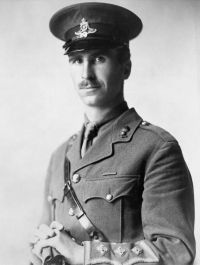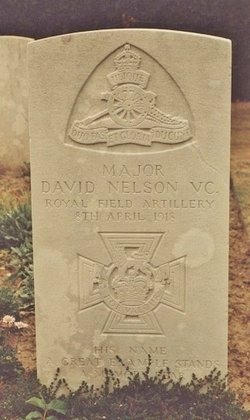 |
|||||||||
David Nelson was the first Ulster soldier to be awarded the Victoria Cross in the First World War and one of the first in the entire armed forces during that conflict (the first of all was Maurice Dease from Westmeath).David was born at Darraghlan in Stradnooden, County Monaghan. He was the son of George and Mary (Black) Nelson and the family attended Cahans Presbyterian Church. David attended Urcher National School and Monaghan Model School. He originally enlisted in the Royal Field Artillery in 1904 but later transferred to L Battery of the Royal Horse Artillery where he was promoted bombardier (corporal) in 1910 and also obtained a first class certificate in gunnery from the School of Gunnery at Shoeburyness, the Ministry of Defence establishment for testing guns and training gunners founded in 1849 and located east of London, near Southend. The United Kingdom declared war on 4 August 1914 and the following day David was promoted Sergeant in L Battery, Royal Horse Artillery. The British army, which was very small compared to the millions of troops of the German army which stormed through Belgium and northern France, was though a highly-trained, experienced professional force which attempted to stop the German advance at the town of Mons in Belgium. However, on 23 August the French army, like the German army millions strong but composed mostly of inexperienced conscripts, retreated. The British had little choice but to retreat as well. During the retreat there would be engagements in which the retreating troops would try to hold up their pursuers. One such action took place on 1 September at a place called Néry, about 35 miles north-east of Paris. For a whole morning Nelson’s unit, L Battery, held up a considerably larger force, the German 4th Cavalry division. Though of short duration, fighting was bitter and highly destructive. It began early, before morning mist had cleared, and L Battery lost three of its six guns before the Battery deployed to fire back, and it soon lost two more guns. L Battery manned the last gun as best it could, and was able under heavy bombardment to keep its own fire until the last shell had been used. One of those working the gun to the last was David, whose precise job was range-finder; he stuck to his position even though seriously wounded and ignoring orders to retire. This required hospitalisation, and two days later was taken prisoner, though he managed to escape soon after. A week later as he recuperated in a French hospital he wrote: “My Battery suffered a heavy loss on Tuesday morning September 1st, but I escaped with two wounds – one slight on the thigh, the other severe on the right side. We were taken prisoner by the Germans on Wednesday night. However I escaped on Saturday and found my way to French troops”. David’s VC was gazetted (published in the relevant official journal) on 16 November 1914, the day after he was commissioned as a second lieutenant. His citation reads “On 1 September 1914, Sergeant David Nelson helped to bring the guns into action – with an officer Edward Kinder Bradley and a warrant officer George Thomas Durell – under heavy fire and in spite of being severely wounded. He remained with the guns until all the ammunition was expended, although he had been ordered to retire to cover”. Slowly he recovered from his serious injuries and returned to Monaghan where he was treated as a hero and given a ceremonial sword and service scabbards with full dress belt and slings in recognition of his bravery and the distinction he had brought to his home community. David was promoted first lieutenant in June 1915 and spent a period as a Captain-Instructor at the School of Gunnery. He married Ada Jane Jessie Bishop on 14 November 1915 and had a son Victor Cyril. On his final journey to France, he wrote to his mother: “It has been my wish since I have been a boy that I might go to war for England”. His posting to France in 1918 was planned as an eight week reconnaissance mission. On April 7th his Battery Mess was hit by a shell and David was badly wounded. He died the following day from his injuries and was buried in Lillers Communal Cemetery, Pas de Calais, France.
|
|||||||||
Archives
- April 2018
- March 2018
- November 2017
- October 2017
- September 2017
- July 2017
- June 2017
- May 2017
- April 2017
- January 2017
- October 2016
- September 2016
- August 2016
- July 2016
- June 2016
- May 2016
- April 2016
- March 2016
- February 2016
- November 2015
- October 2015
- September 2015
- August 2015
- July 2015
- June 2015
- May 2015
- April 2015
- March 2015
- February 2015
- January 2015
- December 2014
- November 2014
- October 2014
- September 2014
- August 2014
- July 2014
- June 2014
- May 2014
- April 2014
- March 2014
- February 2014
- January 2014
- December 2013
- November 2013
- October 2013
- September 2013
- August 2013
- July 2013
- June 2013
- May 2013
- April 2013
- March 2013
- February 2013
- January 2013
- December 2012
- November 2012
- October 2012
- September 2012
- August 2012
- July 2012
- June 2012
- May 2012
- April 2012
- March 2012
- February 2012
- January 2012
- December 2011
- November 2011
- October 2011
- September 2011
- August 2011
- July 2011
- June 2011
- May 2011
- April 2011
- March 2011
- February 2011
- January 2011
- December 2010
- November 2010
- October 2010
- September 2010
- August 2010
- July 2010
- June 2010
- May 2010
- April 2010
- March 2010
- February 2010
- January 2010
- November 2009
- October 2009
- September 2009
- July 2009
- March 2009
- September 2008
- June 2008
- May 2008
- February 2008
- September 2007
- May 2002
- November 2001
- June 2001
- April 2001
- August 2000
- February 1998
- January 1997
- July 1996
- November 1995
- April 1995
- March 1994
- July 1992
- September 1991
- June 1990
- September 1986
- May 1983
- April 1983

